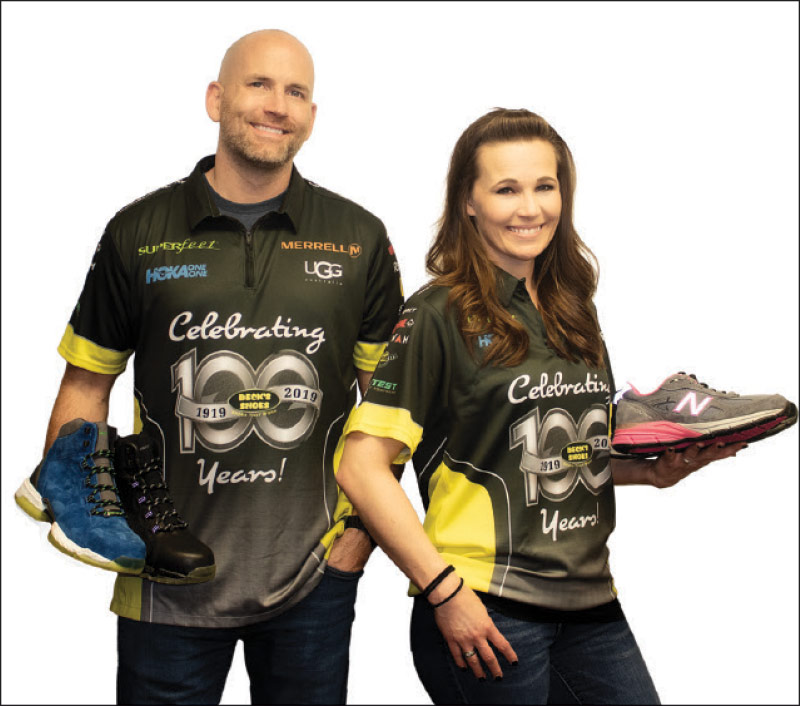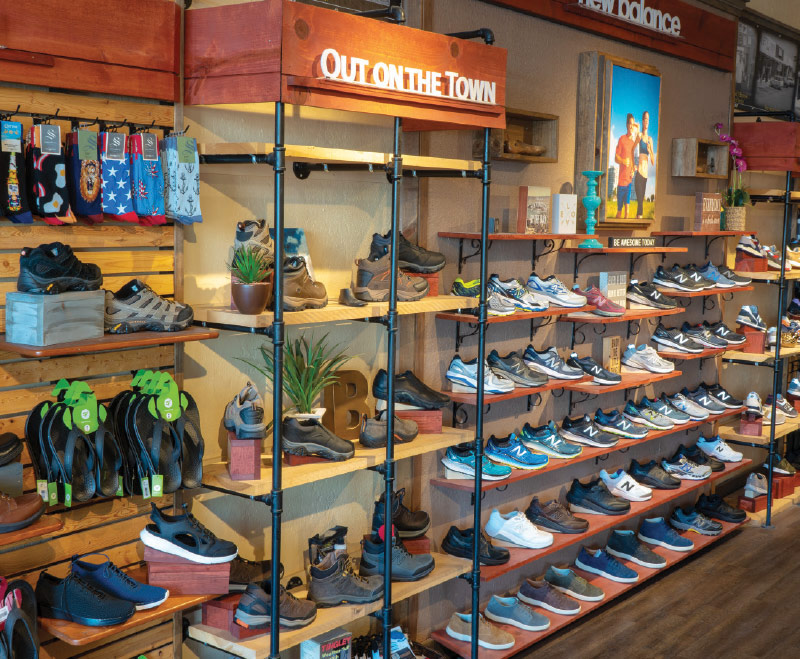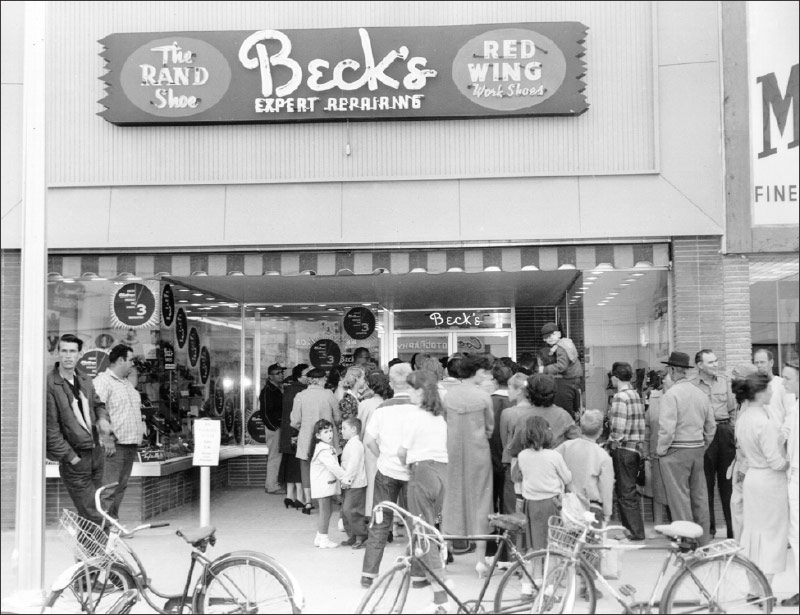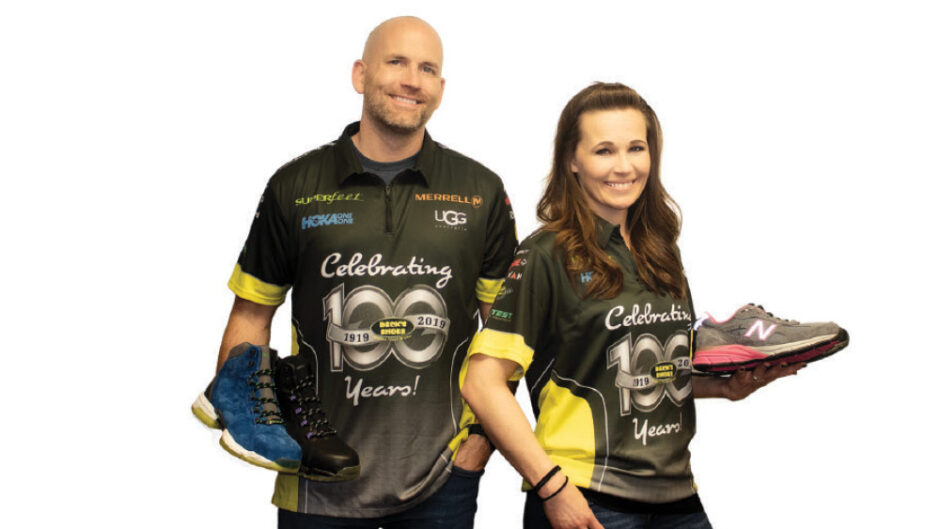
At the height of the pandemic’s first wave this spring, Beck’s Shoes closed for about 48 hours. But then it got its lawyer involved to reopen on the grounds it’s an essential business that supplies safety footwear to first responders. That is most certainly true, as safety footwear for the 17-store chain (plus four mobile trucks and an ecommerce site) amounts to a hefty 40 percent of its overall sales. But there was another reason Beck’s scrambled to get as many of its stores open ASAP—to keep paying its employees.
“Everyone was freaking out and closing down and we decided to keep our doors open,” says Adam Beck, CEO, noting the store did about 25 percent of normal sales, or just enough to cover payroll. “We have lots of people who’ve been long-term team members and we wanted to keep money going into their family households.”
Julia Beck-Gomez, president and COO, knew it was just the right thing to do, which her 24-year-old stepdaughter repeatedly confirmed by saying how impressed she was by the commitment. (She was immediately let go from her employer by a text.) “She was amazed at how we were trying so hard to keep our employees in a good place and that we practice what we preach,” Beck-Gomez says. “We talk a lot about being a family-owned business with an amazing culture, and that our team is a part of our family. We put our money where our mouth is, and I’m extremely proud of the decision we made during this terrible time and believe it will benefit our entire company going forward.”
Beck says it already has. “With so many of their friends and family losing their jobs, the fact that this little mom-and-pop, multigenerational shoe chain kept them employed created a lot of loyalty to us,” he says. “I’ve been managing retail sales now for over two decades, and our team now is the most willing and competent one that we’ve ever had.”
Family Values

Beck’s Shoes is a family-owned and operated business in the truest sense. Beck and Beck-Gomez represent the fifth-generation to sit at the helm of the business founded by their great grandfather, Ole Beck, in 1919, amid another global pandemic, coincidently. The duo grew up in the business (see sidebar, p. 20) and, since taking day-to-day charge about five years ago, have set Beck’s on a transformative course of solid growth and expansion. In fact, as many retailers nationwide downsize, or disappear, Beck’s is opening stores—two during the pandemic, in Yuba, CA (May 1) and Medford, OR (July 1). And additional store acquisitions are in the works. “We have three more on the horizon, one slated to open this spring,” Beck confirms, adding that he sees six to 10 more acquisition opportunities within its current market region. Adds the numbers-oriented Beck-Gomez, “It just has to pencil out: can we get the right lease, do we have the right occupancy and the payroll percentage for that space? If we check all the boxes, it doesn’t matter if it’s located in a mall, a strip center or if its free standing.”
Adding shoe stores before this pandemic was newsworthy considering the recent industry-wide cosolidation, but during it borderlines on, “Are you nuts?” But Beck assures the moves are well-thought-out and sound. For starters, the new additions are takeovers of the Johnson Shoes chain and a Don’s Shoes location. They have proven track records and the deals were already in the works well before the pandemic. “Johnson’s has been around for about 105 years, but they didn’t have a next generation and we’d been in discussions with the family since October,” he says, adding that Don’s opened in 1974 and did $1.6 million in sales last year. “We didn’t want to slow things down and we were able to renegotiate with the landlords and the families to make the transitions happen.”
Beyond that, Beck is a firm believer that when opportunity knocks, answer the door. “These opportunities probably won’t exist in six months,” he says. “Once doors are closed for more than that, consumers move on.” The potential reward in these cases, he adds, is more than worth any risks involved. “These retailers have spent decades and countless hours of blood, sweat, tears and marketing dollars building their businesses, and we believe we’ve come up with a recipe that lets us step in and keep them thriving.” What’s more, Beck’s has the infrastructure in place to absorb the businesses. “I think we can handle 25 stores without having to do anything different in terms of us our backroom capabilities,” he says.
Such a progressive and positive business outlook, Beck admits, runs counter to the mindset of many of his independent retailer colleagues. “Even during good times, the mindset is generally negative,” he says. “It’s always something…the Internet, Amazon, DTC, the economy, regulations, politicians, etc. They’re focusing their energy on aspects that they have no control over and, as a result, aren’t able to be as productive when it comes to leading their businesses.” Beck-Gomez believes too many retailers also rely on price to be a point of differentiation and, in the Amazon age, it’s a losing battle. “If we were to just compete in the price game, we’d fail 100 percent of the time,” she says. “It’s just not feasible for us to go down that road. Instead, we recognize what’s missing from the shopping experience, where we have so much opportunity to engage with consumers in a unique sensory experience and in that moment.”
It’s why Beck and Beck-Gomez focus on aspects that they can control—like sales training, employee morale, cash flow, inventory management and the in-store experience. They don’t sweat what Amazon is doing. “The pandemic gave the opportunity for us to slow down, hone in on a few aspects and actually get a lot better on our processes,” Beck-Gomez confirms. “We’ve only gotten stronger as far as the decisions we are making and the processes we are implementing.”
Basics Training

As Beck’s weathered through the pandemic-induced slowdown, it focused on backroom logistics as well as recruitment, be it assessing, attracting and developing talent. With respect to the former, Beck-Gomez says a key aspect was maintaining a healthy position from a cash flow perspective. “It was knowing that we can pivot so much more quickly when we are in a healthy position,” she says, citing its approximately 100 industrial accounts with many area municipalities and corporations (including Apple) as providing a solid base. “At any given time, we have $500,000 in that pending file—money owed to us,” she explains. “Having that in a very healthy place is more essential than ever. As they say, cash is king, and that’s definitely the truth.”
Beck says that solid financial foundation enabled the chain to dial in on its casual assortment—starting with negotiating better terms for both sides. “Because of our good cash position, we were able to help some of our vendor partners liquidate inventories as many were severely over-inventoried,” he says. “We also passed on savings to our customers while maintaining a decent margin, so it was a win-win-win.” The chain was also “very aggressive” with marketing to draw people into its stores.
It helps a great deal that Beck’s business is diversified. It’s not beholden to one format, location or category. It’s a key reason why the chain is weathering this challenge as well as the others it has overcome over the past century. “When industrial is doing well, sometimes the fashion side might not be and vice-versa,” Beck explains. “It’s always been a case of push and pull, depending on the economy, consumer confidence, fashion trends…there are so many factors driving those segments, but they all kind of average out over the years.”
With 40 percent of the business in work sales (led by HyTest), Beck’s then breaks down to 20 percent for insoles and socks (Aetrex, Superfeet, Wigwam, Feetures and Incrediwear lead the way), 15 percent athleisure/running (primarily New Balance and Hoka One One with a little bit of Brooks mixed in) and 25 percent casual. Of the latter, there are about 60 brands in the mix and Beck cites SAS, Ugg, Dansko, Clarks, Birkenstock and Arcopedico as key players. In addition, several up-and-comers round out the selection. “Revere is going to be a huge partner for us, and the newest one is Biza,” Beck says, noting that the chain now has a Director of Branding focused on the overall mix and assortment. “We’ve gotten more favorable deals, so we’ve been able to increase some of our SKU counts, adding some color pops.”
Appealing to the Senses
An enticing array of leading brands is just one ingredient to the Beck’s recipe. Beck and Beck-Gomez say walking into one of their stores is a sensory overload of the good kind. It spans a vibe, look, smell (aroma machines installed in the vents pump out a customized leather scent) and sound (a proprietary playlist plays hots from the 50s to today to appeal to its broad demographic). The execs believe the difference creates enormous opportunity amid a homogenized store landscape. “I feel like few are doing it, and that’s leaving a gaping hole for the ones know how to do it well,” Beck says, adding that not every customer wants to shop for shoes online. “They want and need the service.” Beck-Gomez adds that the stores feature a blend of old and new school elements, like measuring feet on a Brannock device as well as offering Aetrex’s scanning technology.
The final Beck’s ingredient is its courteous and knowledgeable salesforce. “They are professionals that pride in exceeding a customer’s expectations, and that’s our mission statement: to exceed the expectations of everyone we encounter,” Beck-Gomez says. “When you walk into one of our stores, you can tell that the people who work there want to blow your socks off.”
Customers know right away that they are in a Beck’s store and not just any shoe store—starting with 300 to 500 visible logos. “It’s not gaudy or in your face,” Beck assures. “But there’s very minimal vendor call-out because we’re creating and selling our brand first.”
The emphasis on Beck’s branding is just one aspect to a complete redesign ushered in by Beck and Beck-Gomez. The duo has invested millions of dollars into upgrading all its locations, which includes an array of flat screen TVs offering original programming as one example. “Ultimately, it’s like inviting customers into our homes, where all five sensory elements are pleasantly engaged,” Beck says. “We introduce ourselves by first name, we offer customers a tour and a refreshment. It’s all very authentic, and to do so you have to have the right people in those positions. That’s why we hire personalities and then we teach them the business.”
Goal-Oriented
The way Beck and Beck-Gomez see it, Beck’s biggest competition is themselves. Rather than look over their shoulder, they are focused on doing their best and improving on that whenever possible. “We look at our business objectively and try to do better than we did yesterday, because ultimately that’s what is going to build us and create success,” Beck-Gomez says. “We never want to just sit back and say it’s good enough.” Beck uses an Olympic athlete analogy of aiming for a PR (personal record). “Those athletes aren’t training to beat the person from France, Switzerland or wherever, they’re competing against themselves to be their best version,” he says. “And we want Beck’s Shoes to be the best version of ourselves. Even though our competition is good and fierce, as long as we focus on what we can do to get better at every day—having that Olympian mindset—will drive us forward.”
But it’s not all training/striving and no play. “Fun is a huge part of our company culture—we get together for parties, poker nights and fantasy football drafts,” Beck confirms. “It’s all part of working hard and playing hard. We like to eat good food and drink nice wine, but in order to do so we have to be successful. We need to always be working on achieving our PR.” Part of that effort involves recognizing employees whenever appropriate—like giving gift certificates at their favorite restaurant in recognition of a wedding anniversary. “We’re always looking for opportunities to reward as recognition,” Becks says. “It’s one of our core values, along with growth, integrity, leadership and teamwork.”
Smooth Sailing
Despite the stormy industry seas of late, Beck and Beck-Gomez believe Beck’s will weather the storm—and any others that might arise in the days, months and years ahead. They believe they have crafted the right recipe of store design, merchandising plan, sales processes and talent. “It’s all lined up and a well-oiled machine that’s working well,” Beck confirms. Even tremendous social unrest and epic economic uncertainty, not to mention industry challenges like wholesalers ramping up DTC efforts and Amazon showing no signs of slowing down, dampens their outlook. Heck, both Beck and Beck-Gomez admit to being big-time Amazon customers, nor are they overly offended by brands who sell DTC. “I love Amazon because the more time I save buying from them, the more time I can put into my business for it to be successful. And ditto for Julia,” Beck says. “And DTC is just smart.”
Why, exactly? Because the cousins believe there’s room for all formats, and it’s about finding the right partners who are on the same page as Beck’s. “There have been vendors who’ve said our business model doesn’t match up and we have the upmost respect for that,” Beck says. “Now do we make decisions based on how much DTC is part of a brand’s business model? Perhaps. Do we look for vendors that partner in a way that we need to? Absolutely. Again, it’s about aspects that are in our control and not losing sleep over the one that aren’t.” The approach has meant some brand partnerships have ended and others may be on the way out. But there are plenty of new ones that have formed in their replace. “We have tremendous new partners who’ve been absolutely amazing through this whole Beck’s Shoes evolution,” Beck says. “They’re thinking outside of the box with us and not just saying yes to our terms, rather they’re saying let’s build on this together.” He adds, “The good partners are the ones who continue to communicate even after the deals are signed.”
Ultimately, Beck and Beck-Gomez are confident about the future because, well, they’ve done the math. They figure that within the cities where its stores are located they need to do business with only 1.5 to 3 percent of the populations to be successful. “If we can tap into 2.5 percent, we can be very successful,” Beck says. “And if we can sell five percent, we’re probably going to be retire in the next five years.” Beck is confident they can hit those benchmarks. What’s more, Beck-Gomez says the room for growth within its cities is astronomical. “We don’t feel like we’re ever going to run out of people needing or wanting to go into a store for a full-service experience to find footwear that’s best for them,” she says. Adds Beck, “It’s taken a long time to get here as we’ve implemented a lot of changes across all facets of our business, but it’s why we’re so bullish, because the opportunity is there.”
Balance of Power
How two cousins complement each other to run Beck’s Shoes seamlessly.
Perhaps Adam Beck and Julia Beck-Gomez were destined to run Beck’s Shoes one day. As fifth generation members of the shoe retailing family, they have leather for veins. Both worked regularly in the stores during their school-age years, starting from the ground up—sweeping floors and working with customers to the tune of 10-hour days at $2 an hour (Beck) and toiling long hours in the warehouse, billing, bookkeeping and truck run departments (Beck-Gomez). They learned the ins and outs of the business from their fathers and they didn’t take any shortcuts. Still, there was no guarantee that the mantle would be handed to them one day. They had to earn it.
Beck knew by sophomore year in high school that he wanted to make the family business a career. By junior year, he was already working full-time, thanks to his guidance counselor who rearranged his class schedule. As the story goes, the counselor, who had brought up the subject of attending college only to be rebuffed, came into agreement with Beck’s alternate plan once he learned where he worked. He happened to be a (happy) customer whose problem feet (bunions and plantar fasciitis) had been alieved. “He loved the store,” Beck says. “He made it possible so I could get out of school at noon to work and he also got me into business and computer courses that set an early foundation for some of the skillsets I’d need to be successful without going to college.”
Beck-Gomez did attend college, albeit for a year only to discover that her interests and heart lied with Beck’s Shoes as well. “I had this amazing opportunity to work in the family business, or I could stumble my way through college trying to figure out what the world has to offer me,” she says. “I decided to put all my eggs into this family business basket and the rest is history.”
A history that’s still being written. The dynamic retailing duo is relatively young (both turned 40 this year) with decades of industry experience under their belts. You might say they are just getting started, working together effortlessly and blending each other’s skillsets to form an uber executive. Two heads really are better than one. “We fill in the blanks for one another,” Beck says. “We’ve always had a lot of respect for each other, but we also have different skillsets. We make a great team.” Adds Beck-Gomez, “We push each other in different ways. He’s very much a visionary and I’m very detail oriented.” That complement of attributes transfers to middle management. “Seeing us collaborating well makes them more confidant in the overall process and direction,” Beck says.
As for any added pressure to carry on the family legacy and take Beck’s to the next level, the answer is no. Emotions like that are taking out of business decisions, something Beck says his father taught him early on. “It’s like buying your first home, don’t fall in love with the home, fall in love with the deal,” he says. “It has to make sense in dollars and cents. It has to check the boxes. As long as we are doing that and we have the right people working for us, it takes a lot of the pressure off.”
In the meantime, the cousins love their jobs as much as they love working with family. “I love the camaraderie,” Beck-Gomez says. “Even though we’re growing, I still feel the small, familial connections with our team. And being able to create opportunity around us and to see that creates opportunity for everyone makes me excited about every day.” Beck, for his part, feels he’s living the American dream. “I’m in control of my own fate, working for myself and alongside amazingly talented people,” he says. “As Ronald Reagan said, “Surround yourself with the best people you can find, delegate authority and don’t interfere as long as the policy you’ve decided upon is being carried out.’”




